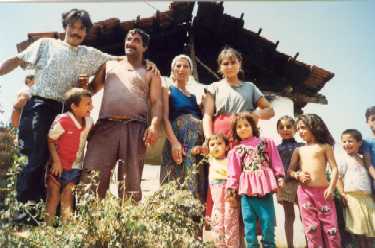Council of Europe Anti-Racism Body Issues Report on Macedonia
22 July 2005
 On February 15, 2004, the European Commission against Racism and Intolerance (ECRI) made public its third report on Macedonia under its country-by-country analysis of racism and intolerance in each of the member states of the Council of Europe. ECRI noted in its report that the situation of Roma in Macedonia is of particular concern citing "deplorable living conditions of many Roma" and that "[Roma] continue to suffer from a cumulation of economic and social disadvantage, aggravated by changing economic conditions, discrimination and insufficient attention by the authorities". ECRI further noted that:
On February 15, 2004, the European Commission against Racism and Intolerance (ECRI) made public its third report on Macedonia under its country-by-country analysis of racism and intolerance in each of the member states of the Council of Europe. ECRI noted in its report that the situation of Roma in Macedonia is of particular concern citing "deplorable living conditions of many Roma" and that "[Roma] continue to suffer from a cumulation of economic and social disadvantage, aggravated by changing economic conditions, discrimination and insufficient attention by the authorities". ECRI further noted that:
"104. A majority of Roma live in ramshackle shacks in unplanned communities that lack roads, sanitation, garbage collection, water, electricity or other elements of a basic infrastructure. […] Roma communities which do benefit from electricity and water reportedly often find themselves entirely cut off from these services because certain inhabitants do not pay their bills and the community is held collectively responsible. It has also been reported to ECRI that those families whose income is derived from social insurance may find themselves in a situation where they are unable to cover electricity and water bills after covering other needs, such as food.
"109. ECRI is concerned about reports that a certain number of Roma lack personal documents, such as identity cards, birth certificates, medical insurance cards, and employment cards. This problem impinges upon Romanis' rights in many other sectors of life, for example the ability to exercise civil rights such as voting, and access to various services, such as social insurance and health care. According to research carried out by non governmental organisations, these problems are connected with discrimination, particularly indirect discrimination, stemming from the criteria for obtaining these documents (such as fees, or a requirement of completing primary education). In addition, problems stem from a cascade effect, where problems in obtaining citizenship impact upon possibilities to obtain other documents.
"110. In the field of health, ECRI is deeply worried over reports that Roma are sometimes unable to access health care, as they are unable to cover the costs of the care. There are reports of persons having died or suffered serious damage as they were unable to receive treatment. Furthermore, Roma are reportedly subject to other inappropriate practices (such as newborns being kept in hospitals while the parents are sent to find money). ECRI notes that a certain number of Roma lack any form of health insurance. However, even those who have such insurance may find themselves unable to cover the complementary participation that is required."
ECRI commented extensively on several other areas of concern including the high rate of unemployment, low attendance and high drop out rates of Romani children in education and prejudice on the part of state authorities. ECRI offered numerous recommendations in each of the aforementioned areas. The full text of the report is available online at http://www.coe.int/T/E/human%5Frights/ecri/1%2DECRI/. Further information on the situation of Roma in Macedonia can be found on the ERRC's website at: http://www.errc.org.
(ERRC)




